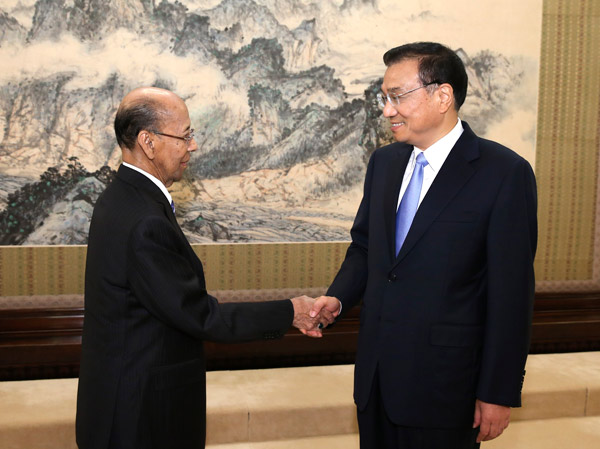Premier vows every assistance in talks with Malaysian head of state
 |
|
Chinese Premier Li Keqiang (R) meets with Malaysian Supreme Head of State Abdul Halim Mu'adzam Shah in Beijing, capital of China, Sept 5, 2014. [Photo/Xinhua] |
Premier Li Keqiang on Friday asked for better communication with Malaysia in the follow-up on the missing Malaysia Airlines Flight MH370 and promised necessary assistance.
He made the remarks when meeting visiting Malaysian Supreme Head of State Abdul Halim Mu'adzam Shah in Beijing.
Malaysia Airlines Flight MH370, carrying 239 people including 154 Chinese, disappeared on March 8 after leaving Kuala Lumpur en route to Beijing. Despite a multinational search and rescue effort - the largest and most expensive marine search ever undertaken - no confirmed flight debris or crash site has been found.
Halim, who oversaw the establishment of bilateral diplomatic ties in 1974 during his first visit to China, said the Malaysian people have a great affection toward China, and the country will maintain "close coordination" with China on the issue.
Li said he hopes Malaysia, the first country in the Association of Southeast Asian Nations to establish diplomatic ties with China, will continue to promote China-ASEAN cooperation.
In 2013, ASEAN received $8.6 billion in direct investment from China, a 60.8 percent increase year-on-year.
Trade volume reached $106.08 billion in 2013 as Malaysia instituted more investor-friendly policies to Chinese enterprises in various industries, especially in the Port Kelang Free Trade Zone.
Xia Baowen, president of Malaysia China International Business Center, said the two countries are trying to expand their cooperation to broader sectors to narrow the deficit of bilateral foreign direct investment.
Malaysia has more than $6 billion of investment in China, compared with Chinese investment in Malaysia of only $1 billion.
Tourism, which is a traditional sector of cooperation, has been greatly affected by the disappearance of MH370, Xia said. Bookings from China dropped 50 percent to 60 percent after the plane disappeared, Malaysia Airlines' director of commercial operations Hugh Dunleavy told Bloomberg News in May.
